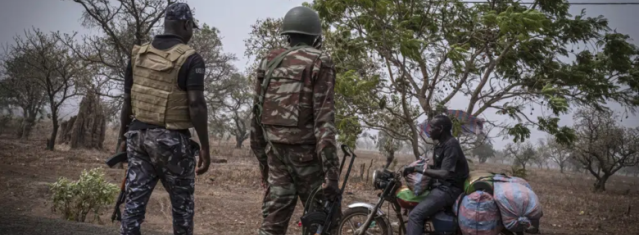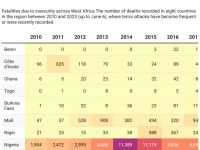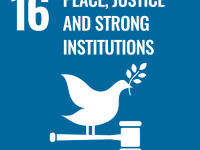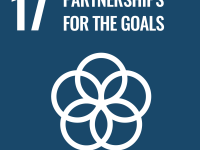News
EXTREMIST VIOLENCE IN THE SAHEL IS TRICKLING DOWN
TO WEST AFRICA’S COASTAL COUNTRIES

A checkpoint outside Porga in the Atakora (Source: AP Photo/Marco Simoncelli)
ARAC International Strategic Communications -
By
Kunle Adebajo | HumAngle Media
The battlefields between terrorists and state forces are expanding towards the Gulf of Guinea, with attacks taking place in Benin, Ghana, Ivory Coast, and Togo. Why is it happening, and what are these countries doing to keep the peace?
West Africa has been embroiled in armed conflict for many years as terror groups wage war on governments and civilians. Not all of West Africa is affected, though. The violence is concentrated in some countries more than others. But that is gradually changing.
Kunle Adebajo | HumAngle Media
The battlefields between terrorists and state forces are expanding towards the Gulf of Guinea, with attacks taking place in Benin, Ghana, Ivory Coast, and Togo. Why is it happening, and what are these countries doing to keep the peace?
West Africa has been embroiled in armed conflict for many years as terror groups wage war on governments and civilians. Not all of West Africa is affected, though. The violence is concentrated in some countries more than others. But that is gradually changing.
Nigeria was one of the first countries to experience extremist insurgencies with the rise of Boko Haram in 2009. Then in 2012, northern Mali fell under the control of jihadist rebels. But the crises began to spread. Today, the Lake Chad region, which includes Nigeria and Niger (as well as Cameroon and Chad in other African subregions), and the Liptako-Gourma region of Burkina Faso, Mali, and Niger are grappling with conflict and instability. The bulk of the affected places falls within the Sahel, a semi-arid region just below the Sahara desert that cuts through northern Senegal all the way down to Sudan in East Africa.
Many of the extremist groups operating in the region have formed alliances with global organisations such as al-Qaeda and the Islamic State, making them even more formidable and ambitious. Thousands of people are killed every year, and millions have been displaced by the violence.
Many of the extremist groups operating in the region have formed alliances with global organisations such as al-Qaeda and the Islamic State, making them even more formidable and ambitious. Thousands of people are killed every year, and millions have been displaced by the violence.
“Most significantly, the geographic focus of terrorist attacks has shifted eastwards from Mali to Burkina Faso and is increasingly threatening West African coastal states,” former Head of the UN Office for West Africa and the Sahel (UNOWAS), Mohamed Ibn Chambas, warned in 2020.
What seemed like a possibility then is fast becoming a reality as insurgents have conducted a series of attacks in these new countries, spreading violence further south towards the Atlantic.
What seemed like a possibility then is fast becoming a reality as insurgents have conducted a series of attacks in these new countries, spreading violence further south towards the Atlantic.
A dangerous trend
One of the early warning signs came from the Burkinabè intelligence services in 2019 when it gathered that terrorists were taking refuge in Benin, Ghana, and Togo and making calls to people in these countries. Before then, their contacts with neighbouring countries were mostly limited to Mali and Nigeria.In Feb. 2021, the head of France’s military intelligence agency, Bernard Emié, revealed that top commanders of Al-Qaeda in the Islamic Maghreb (AQIM) met to plan for “a series of large-scale attacks against military bases” as they expanded towards countries along the Gulf of Guinea. At the time, he said the group had started sponsoring fighters to move to Benin and Cote d’Ivoire.
The situation has since escalated from phone conversations and meeting talk points to actual violence.
One of the first countries to be attacked was Benin, where two French tourists were kidnapped and their local guide killed in May 2019. The incident took place at the Pendjari National Park, located in the northern region that shares borders with Burkina Faso. No terror group claimed responsibility. But two years later, in Dec. 2021, Jama’at Nasr al-Islam wal Muslimin (JNIM), an al-Qaeda-linked terror group based in Mali, admitted attacking a military post in the northern Atacora region, also close to the borders with Burkina Faso. Its fighters killed two soldiers. More attacks have taken place in the area afterwards.
In early May, an attack in the Kerou region of northern Benin led to the death of 15 people. The area shares borders with Nigeria, Niger, and Burkina Faso, which all have the presence of terror groups. According to locals, some of the victims had their throats slit, and others were missing after the incident. Another source of worry for the Beninoise people is the W Transborder Park. It sprawls across Benin, Burkina Faso, and the Niger Republic and could be an entry point for terrorists, who have camped there since 2018.
In early May, an attack in the Kerou region of northern Benin led to the death of 15 people. The area shares borders with Nigeria, Niger, and Burkina Faso, which all have the presence of terror groups. According to locals, some of the victims had their throats slit, and others were missing after the incident. Another source of worry for the Beninoise people is the W Transborder Park. It sprawls across Benin, Burkina Faso, and the Niger Republic and could be an entry point for terrorists, who have camped there since 2018.
The night between May 10 and 11, 2022, Togo was hit by its first deadly terror attack in recent years. Dozens of assailants had crossed the border from Burkina Faso and attacked a military post in Kpékpakandi, killing eight soldiers and injuring 13 others. JNIM claimed responsibility for this attack too.
It wasn’t a chance event. There have been several attacks afterwards blamed on jihadi militants in the region. There was a violent attack in Kpendjal about two months later that led to the death of 14 people. Last February, attackers killed at least 31 civilians in two communities in the Savanes region. Again in July, an explosion suspected to have been triggered by terrorists killed seven children.
The attacks have led to internal displacements as people flee their villages in droves to save their lives. Businesses have taken a downturn. Locals have also become more vigilant, unsure of who to trust.
It wasn’t a chance event. There have been several attacks afterwards blamed on jihadi militants in the region. There was a violent attack in Kpendjal about two months later that led to the death of 14 people. Last February, attackers killed at least 31 civilians in two communities in the Savanes region. Again in July, an explosion suspected to have been triggered by terrorists killed seven children.
The attacks have led to internal displacements as people flee their villages in droves to save their lives. Businesses have taken a downturn. Locals have also become more vigilant, unsure of who to trust.
For Cote d’Ivoire, the shock came much earlier when three men stormed the Grand Bassam resort in March 2016 and opened fire for nearly one hour, killing 19 people and injuring 33 others. AQIM said it targeted the country for deploying its soldiers in support of French military operations in Mali.
In June 2020, suspected jihadists killed 14 soldiers during an attack in Kafolo. At least four terrorist incidents were recorded in northern Cote d’Ivoire the following year, including one that led to the death of 12 soldiers.
Ghana, which has been ranked one of the most peaceful countries in Africa, suffered its first attack last February as a group tried to blow up a bridge in the Bawku area close to the border. The defence minister described them as “criminals” while also expressing concern about real threats of terrorism.
In June 2020, suspected jihadists killed 14 soldiers during an attack in Kafolo. At least four terrorist incidents were recorded in northern Cote d’Ivoire the following year, including one that led to the death of 12 soldiers.
Ghana, which has been ranked one of the most peaceful countries in Africa, suffered its first attack last February as a group tried to blow up a bridge in the Bawku area close to the border. The defence minister described them as “criminals” while also expressing concern about real threats of terrorism.
Meanwhile, though Nigeria has been a victim of violent extremism for over a decade, it has also seen the trend of local terrorists pushing further south. There have recently been attacks in the north-central capital city of Abuja and Ondo, a coastal state in the southwest.
Analysis of figures compiled by the Armed Conflict Location & Event Data Project (ACLED) shows that all eight affected West African countries were relatively peaceful between 2010 and 2011 — except Ivory Coast, which experienced an intense political crisis in that period, and Nigeria, where the Boko Haram crisis had already started and which also experienced great election violence.
Death tolls increased significantly in Mali in 2012, Niger in 2015, and Burkina Faso in 2019.
Benin has seen a steady rise in fatalities since 2016 and Togo since 2022. While not all of these deaths were due to terrorism, they reflect broader insecurity and political violence, which terror groups may take advantage of.
Analysis of figures compiled by the Armed Conflict Location & Event Data Project (ACLED) shows that all eight affected West African countries were relatively peaceful between 2010 and 2011 — except Ivory Coast, which experienced an intense political crisis in that period, and Nigeria, where the Boko Haram crisis had already started and which also experienced great election violence.
Death tolls increased significantly in Mali in 2012, Niger in 2015, and Burkina Faso in 2019.
Benin has seen a steady rise in fatalities since 2016 and Togo since 2022. While not all of these deaths were due to terrorism, they reflect broader insecurity and political violence, which terror groups may take advantage of.
Why are the armed groups expanding?
Experts believe attacks on countries bordering the Atlantic coast are strategic and could benefit terror groups in various ways. They allow the terrorists to protect financial flows and secure supply lines for items such as food, equipment, fuel, motorcycles, and fertiliser. Having control over certain routes also means they can access markets for selling illegally obtained commodities like cattle and gold.Expanding gives terror groups opportunities to recruit more members. They could exploit grievances from existing crises in the new areas, such as tensions between farmers and herders, gross human rights violations, fights over chieftaincy titles, disputes over land and other resources, and underdevelopment.
Pushing into these countries might also help them to weaken opposition from state actors.
“The militant groups seek to prevent the concentration of military force of West African states and their Western partners. This is best viewed as a semi-guerilla strategy that spreads the forces of your opponent thin. Hence, attacks everywhere warrant protection everywhere and prevent large-scale military operations,” Kars de Bruijne, a Senior Research Fellow at the Clingendael Institute's Conflict Research Unit, suggested to Al Jazeera.
The recent trend of military coups or coup attempts in places like Burkina Faso, Chad, Guinea, and Niger show rising political instability that could be exploited by preying insurgents.
“The militant groups seek to prevent the concentration of military force of West African states and their Western partners. This is best viewed as a semi-guerilla strategy that spreads the forces of your opponent thin. Hence, attacks everywhere warrant protection everywhere and prevent large-scale military operations,” Kars de Bruijne, a Senior Research Fellow at the Clingendael Institute's Conflict Research Unit, suggested to Al Jazeera.
The recent trend of military coups or coup attempts in places like Burkina Faso, Chad, Guinea, and Niger show rising political instability that could be exploited by preying insurgents.
How are the countries reacting?
Benin, Burkina Faso, Côte d’Ivoire, Ghana and Togo, countries affected by the spread of terrorism from the Sahel, recognised the danger long before the attacks started. That is why, in 2017, they launched the Accra Initiative with the hope of addressing it together with organised transnational crime. Two years later, the alliance invited Mali and Niger as observers. The initiative helps the countries to share intelligence, train security personnel, and conduct joint military operations.The countries have independently taken other steps to protect themselves too.
Benin has improved access to basic infrastructure for its nomadic Fulani population, an ethnic group targeted for recruitment by jihadists in neighbouring countries. It stationed more soldiers at the Pendjari National Park, sharing borders with Burkina Faso. It has also increased its military budget and is planning to recruit thousands more soldiers and police officers into its forces.
Under what it calls Operation Koundjouaré, Togo has deployed more soldiers to the affected communities since the May attack last year. The security agents patrol often.
In June 2022, the authorities declared a state of emergency in the northern Savanes region so that they could make urgent life-saving decisions quickly and grant security forces more flexibility. When the initial period of three months lapsed, the government extended the state of emergency by six months and then again by a year — indicating that there haven’t been significant improvements. “The situation remains worrying,” the Minister of Security, General Damehame Yark, admitted in April.
But civil society actors are worried that the government has become tight-lipped on the latest developments, especially since August last year.
Meanwhile, the Togolese government is taking non-military steps to combat the problem too. In 2018, it established the Committee for the Prevention and Fight Against Violent Extremism (CIPLEV), which engages with young people who may be targeted by terrorists as potential recruits. The committee also implements socio-economic resilience projects in vulnerable areas and improves relations between security agents and the people.
But civil society actors are worried that the government has become tight-lipped on the latest developments, especially since August last year.
Meanwhile, the Togolese government is taking non-military steps to combat the problem too. In 2018, it established the Committee for the Prevention and Fight Against Violent Extremism (CIPLEV), which engages with young people who may be targeted by terrorists as potential recruits. The committee also implements socio-economic resilience projects in vulnerable areas and improves relations between security agents and the people.
The Ivorian authorities are working with religious leaders, civil society actors, and teachers to detect early signs of radicalisation. They launched an educational kit, Mallette Pédagogique, to promote peaceful coexistence. They also passed various anti-terrorism laws, created agencies to tackle terrorism through research, intelligence, and security measures, and have been deliberate about prosecuting arrested suspects. They’ve been getting support from INTERPOL and countries such as the United States and France to bolster the local security infrastructure.
In Ghana, the government boosted security along the land borders, introduced a new emergency line for terrorist threats, launched a campaign to get the public’s cooperation, started programmes to improve the economy of the northern region, and planned to start broadcasting educational programmes.
In Ghana, the government boosted security along the land borders, introduced a new emergency line for terrorist threats, launched a campaign to get the public’s cooperation, started programmes to improve the economy of the northern region, and planned to start broadcasting educational programmes.
But these countries cannot cope by themselves. Fighting terrorism requires a tremendous amount of resources that cannot entirely be sourced locally. Both the African Union and the United Nations have released statements showing concern about developments in the Western Sahel region. But beyond that, they also need to support military and non-kinetic efforts in the affected communities.
“In today’s hyper-connected world, the spread of terrorism in Africa is not a concern for African Member States alone. The challenge belongs to all of us,” UN Deputy Secretary-General Amina Mohammed observed in November.
“Prevention remains our best response to terrorism, violent extremism and other threats to peace and security. We must address the instability and conflict that can lead to terrorism in the first place, as well as the conditions exploited by terrorists in pursuit of their agendas. If terrorist and extremist views too often find a welcome home with deeply dissatisfied, marginalised and desperate people, it is up to us to help formulate responses that address those conditions.”
“In today’s hyper-connected world, the spread of terrorism in Africa is not a concern for African Member States alone. The challenge belongs to all of us,” UN Deputy Secretary-General Amina Mohammed observed in November.
“Prevention remains our best response to terrorism, violent extremism and other threats to peace and security. We must address the instability and conflict that can lead to terrorism in the first place, as well as the conditions exploited by terrorists in pursuit of their agendas. If terrorist and extremist views too often find a welcome home with deeply dissatisfied, marginalised and desperate people, it is up to us to help formulate responses that address those conditions.”
more information: https://www.arac-international.org/2023/06/extremist-violence-in-sahel-is.html
Liability for this article lies with the author, who also holds the copyright. Editorial content from USPA may be quoted on other websites as long as the quote comprises no more than 5% of the entire text, is marked as such and the source is named (via hyperlink).









